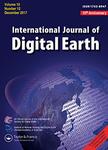Geographic context-aware text mining:enhance social media message classification for situational awareness by integrating spatial and temporal features
地理上下文知道的文章采矿: 由集成空间、时间的特征为 situational 了解提高社会媒介消息分类作者机构:Spatial Computing and Data Mining LabDepartment of GeographyUniversity of Wisconsin-MadisonMadisonWIUSA Department of GeographyPennsylvania State UniversityUniversity ParkPAUSA
出 版 物:《International Journal of Digital Earth》 (国际数字地球学报(英文))
年 卷 期:2021年第14卷第11期
页 面:1721-1743页
核心收录:
学科分类:0502[文学-外国语言文学] 050201[文学-英语语言文学] 05[文学]
基 金:the funding support from the Vilas Associates Competition Award at University of Wisconsin-Madison(UW-Madison) the National Science Foundation[grant number 1940091]
主 题:Spatial data science spatially enabled text mining situational awareness deep learning GeoAI spatial features
摘 要:To find disaster relevant social media messages,current approaches utilize natural language processing methods or machine learning algorithms relying on text only,which have not been perfected due to the variability and uncertainty in the language used on social media and ignoring the geographic context of the messages when ***,a disaster relevant social media message is highly sensitive to its posting location and ***,limited studies exist to explore what spatial features and the extent of how temporal,and especially spatial features can aid text *** paper proposes a geographic context-aware text mining method to incorporate spatial and temporal information derived from social media and authoritative datasets,along with the text information,for classifying disaster relevant social media *** work designed and demonstrated how diverse types of spatial and temporal features can be derived from spatial data,and then used to enhance text *** deep learning-based method and commonly used machine learning algorithms,assessed the accuracy of the enhanced text-mining *** performance results of different classification models generated by various combinations of textual,spatial,and temporal features indicate that additional spatial and temporal features help improve the overall accuracy of the classification.



